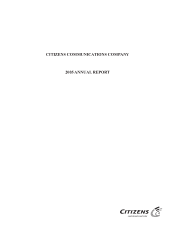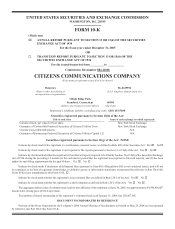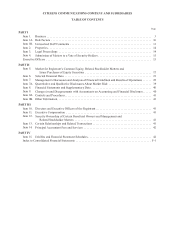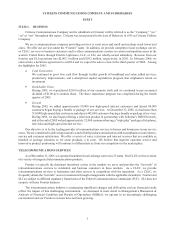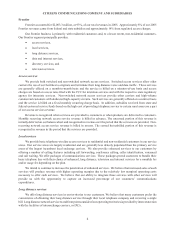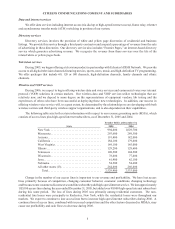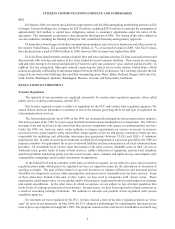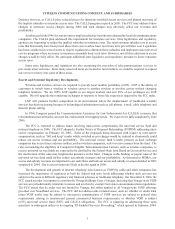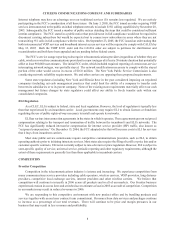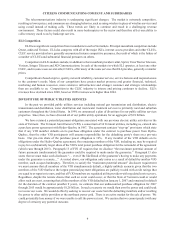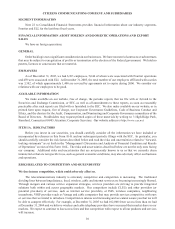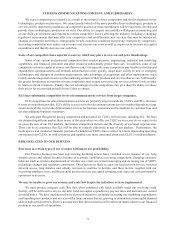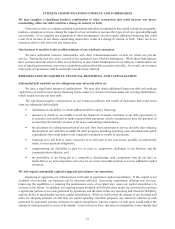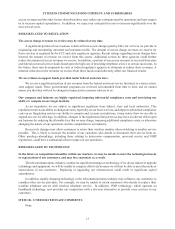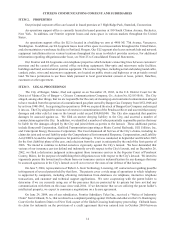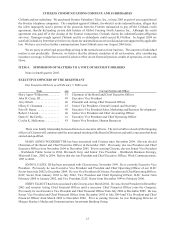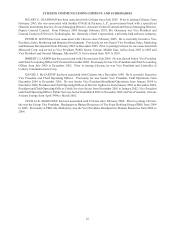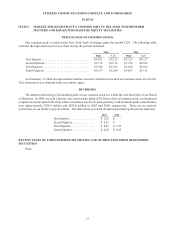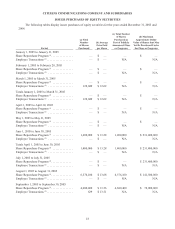Frontier Communications 2005 Annual Report Download - page 10
Download and view the complete annual report
Please find page 10 of the 2005 Frontier Communications annual report below. You can navigate through the pages in the report by either clicking on the pages listed below, or by using the keyword search tool below to find specific information within the annual report.8
CITIZENS COMMUNICATIONS COMPANY AND SUBSIDIARIES
Internet telephony may have an advantage over our traditional services if it remains less regulated. We are actively
participating in the FCC’s consideration of all these issues. On June 3, 2005, the FCC issued an order requiring VOIP
services interconnected to the public switched telephone network to include E-911 calling capabilities by November 28,
2005. Subsequently, the FCC issued a number of public notices detailing the steps that could be considered sufficient
interim compliance. The FCC stated in a public notice that providers not in full compliance would not be required to
disconnect existing subscribers but would be expected not to connect new subscribers in areas where they are not
transmitting 911 calls in full compliance with the rules. On September 23, 2005, the FCC issued an order stating that
both interconnected VOIP services and broadband internet access services will be required to comply with CALEA by
May 12, 2007. Both the VOIP E-911 order and the CALEA order are subject to petitions for clarification and
reconsideration and both have been appealed and are pending before federal courts.
The FCC’s service outage reporting rules require telecommunications providers (regardless of whether they are
cable, wireless or wireline communications providers) to repor t outages of at least a 30 minute duration that potentially
affect at least 900,000 user-minutes. The initial FCC order, which included required reporting of certain non-service
interrupting network outages, was partially stayed. The network modifications necessary to comply with the stayed
portion of the order would cost us in excess of $16.0 million. The New York Public Service Commission is also
considering network reliability requirements. We and other carriers are opposing these proposed requirements.
Some state regulators (including New York and Illinois) have in the past considered imposing on regulated
companies (including us) cash management practices that could limit the ability of a company to transfer cash
between its subsidiaries or to its parent company. None of the existing state requirements materially affect our cash
management but future changes by state regulators could affect our ability to freely transfer cash within our
consolidated companies.
ELI Regulation
As a CLEC, ELI is subject to federal, state and local regulation. However, the level of regulation is typically less
than that experienced by an incumbent carrier. Local governments may require ELI to obtain licenses or franchises
regulating the use of public rights-of-way necessary to install and operate its networks.
ELI has various interconnection agreements in the states in which it operates. These agreements govern reciprocal
compensation relating to the transport and termination of traffic between the incumbent’s and ELI’s networks. The
FCC has significantly reduced intercarrier compensation for internet service provider (ISP) traffic, also known as
“reciprocal compensation.” On December 15, 2004, the FCC adopted rules that will increase costs to ELI for services
that it buys from incumbent carriers.
Most state public service commissions require competitive communications providers, such as ELI, to obtain
operating authority prior to initiating intrastate services. Most states also require the filing of tariffs or price lists and/or
customer-specific contracts. ELI is not currently subject to rate-of-return or price regulation. However, ELI is subject to
state-specific quality of service, universal service, periodic reporting and other regulatory requirements, although the
extent of these requirements is generally less than those applicable to incumbent carriers.
COMPETITION
Frontier Competition
Competition in the telecommunications industry is intense and increasing. We experience competition from
many communications service providers including cable operators, wireless carriers, VOIP providers, long distance
providers, competitive local exchange carriers, internet providers and other wireline carriers. We believe that
competition will continue to intensify in 2006 across all products and in all of our markets. Our Frontier business
experienced erosion in access lines and switched access minutes of use in 2005 as a result of competition. Competition
in our markets may result in reduced revenues in 2006.
We are responding to this competitive environment with new product offers and by bundling products and
services together with an end user contract term commitment. Revenues from data services and packages continue
to increase as a percentage of our total revenues. There will continue to be price and margin pressures in our
business that may result in less revenues and profitability.

